‘They’re going to complain’: Apartments squeeze city music pubs
A proposed 16-storey apartment block behind a heritage-listed pub featuring live music shines a spotlight on the impact of high-density development threatening music venues in Adelaide’s CBD. Thomas Kelsall does a roll-call of the dead, threatened or hanging in there.

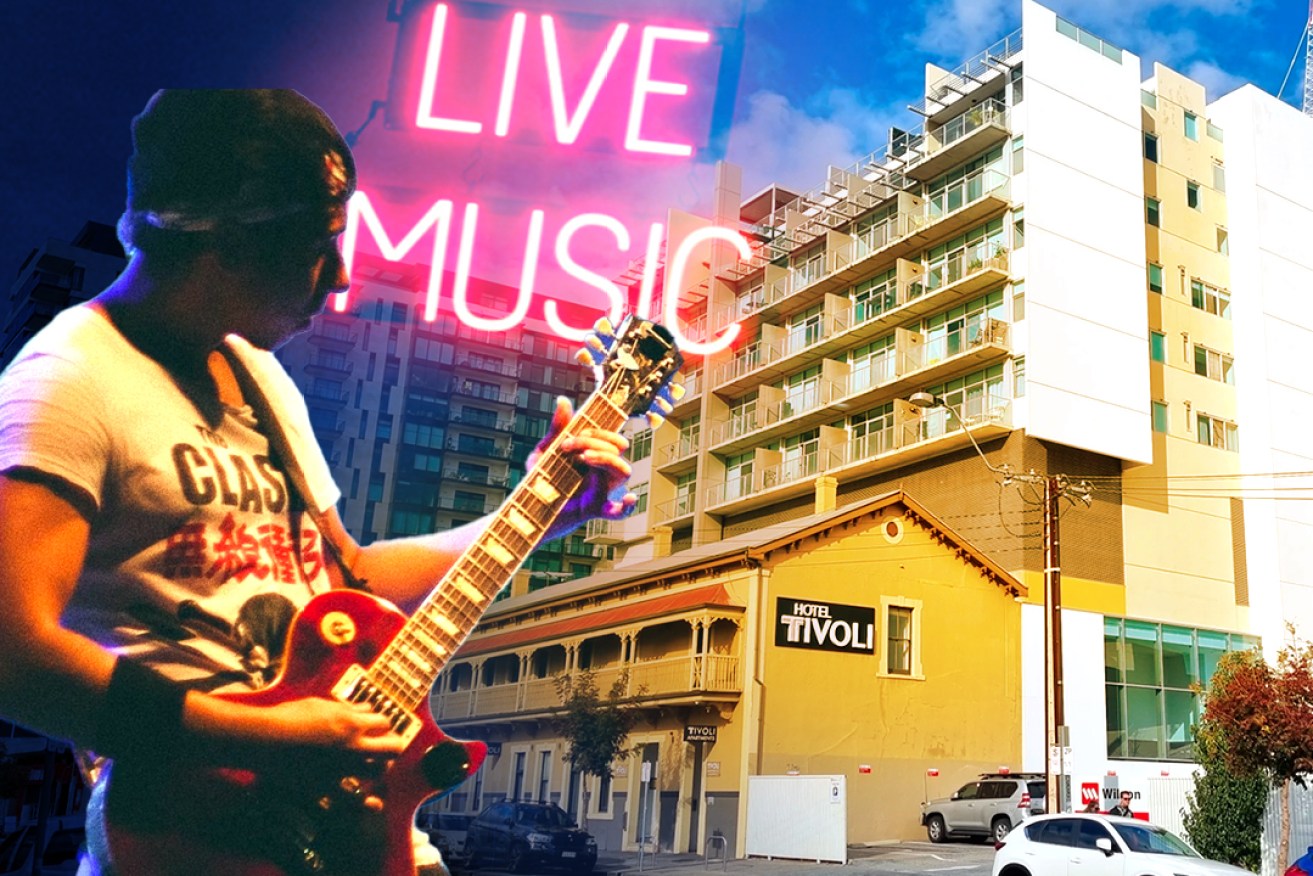
Photo: Thomas Kelsall/InDaily Image: Tom Aldahn/InDaily
Residents living near the King’s Head Hotel on King William Street are fighting a proposal for a 16-storey mixed-used tower complex to be built directly behind the state heritage-listed pub.
Built in 1876, the King’s Head remains an active live music venue on Friday and Saturday nights, and was once the stomping ground for the original 1960s line up of iconic Australian rock group, The Masters Apprentices, which rehearsed in the pub’s back shed.
If the apartment block is approved, potential future tension between its hundreds of new residents living directly above the old pub and loud live music can already be guessed at. There are numerous nearby examples to cite, including once-busy pubs now dormant or dead.
It’s a tension which will increasingly play out as more apartments blocks are built in the CBD, luring residents attracted to the city vibrancy but not always appreciating that part of that vibrancy is the live music scene which has nurtured generations of bands and fans over decades.
Adelaide is a “UNESCO City of Music”, but slowly, development is threatening the venues which give it life.
It’s an ongoing tension, and certainly history would say live music venues generally come off second best.
Switching off the city’s live music pubs

Legendary former music pub The Tivoli is now surrounded by apartments. Photo: Thomas Kelsall/InDaily
The construction of inner-city apartments – along with the rise of the small bar scene and the proliferation of home entertainment – put a dent in the city’s once thriving pub music landscape which nurtured alternative bands including The Mark of Cain – recently inducted into the SA Music Hall of Fame – the Exploding White Mice, Iron Sheiks, The Plague, Lizard Train and Where’s The Pope?
Music street press veteran and BSide Magazine editor Robert Dunstan says the raft of changes which began in the 1990s particularly hurt the city’s East End pub strip.
“Back in the old days, if you wanted entertainment, you went out to a pub to see a band, but now you’ve got so much choice at home,” Dunstan said.
“Thursday night was always a big night. It was very often payday, so people had money.
“So you’d go The Exeter on a Thursday night and it’d be packed, but no longer.”
The Exeter beer garden was famous for bands, and almost overnight we were forced to stop having bands in the beer garden
Dunstan said the shift can be tracked back to the 1990s, when apartment developments sprung up near The Austral.
The Rundle Street pub’s walking distance neighbours, The Exeter, The Crown & Anchor and the Tivoli Hotel, would also soon face the threat of noise complaints from new developments.
“It all started kind of back with The Austral where they had to put in a bunker, a soundproof bunker to have live music,” he said.
“That was because of apartments that were built right next to The Austral.
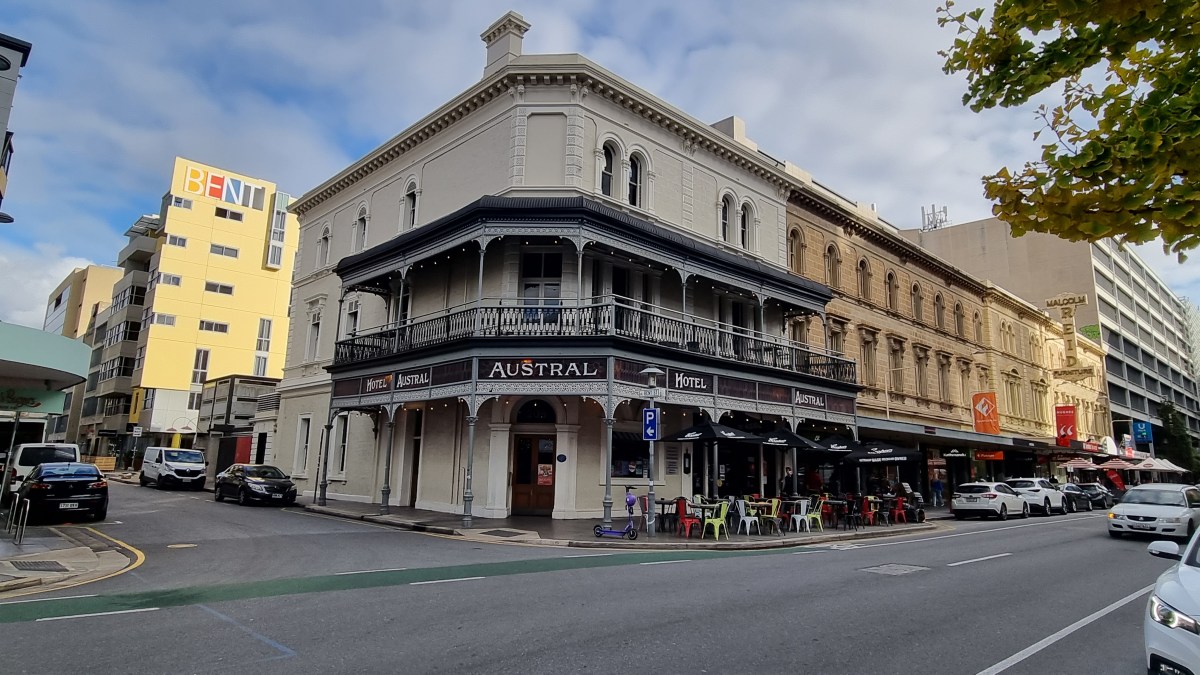
The Austral had to build “The Bunker” over its once-thriving live music beer garden after an apartment block, left, was approved for directly behind it. The move effectively killed bands playing at the pub. Photo: Thomas Kelsall/InDaily
“What the bunker did was actually stop live music there because it just wasn’t suitable … originally it was a beer garden, a wonderful very leafy beer garden.
“They would have bands in there, quite loud bands, but that was before there was any kind of people in the city.”
Another legendary live music venue was the now-closed Tivoli Hotel on Pirie St.
The circa-1850s state heritage-listed pub once hosted countless local, national and international acts. It’s now surrounded by apartments and is unlikely ever to return to its former use.
Once people move in and get comfortable, then residents have quite significant capacities to make complaints
The local heritage listed Hotel Wright Street – once known as the Old Queens Arms and a key venue in Adelaide’s thriving ‘90s alternative music scene – shut down in 2016 after it was bought by offshore investors.
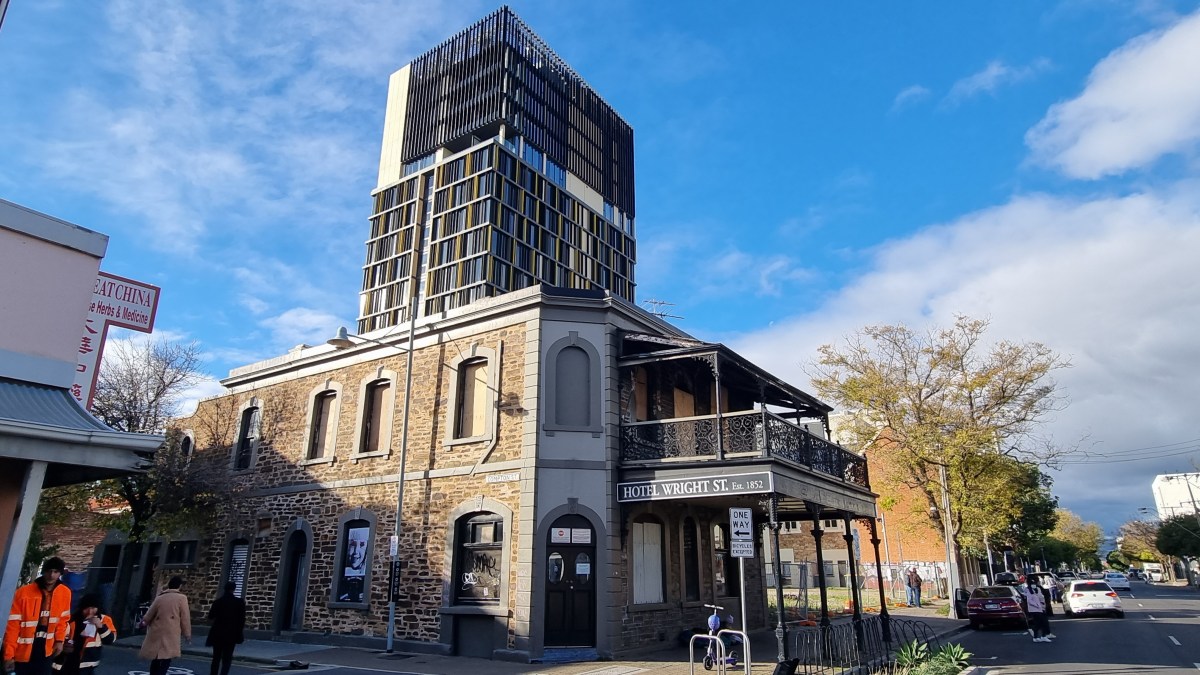
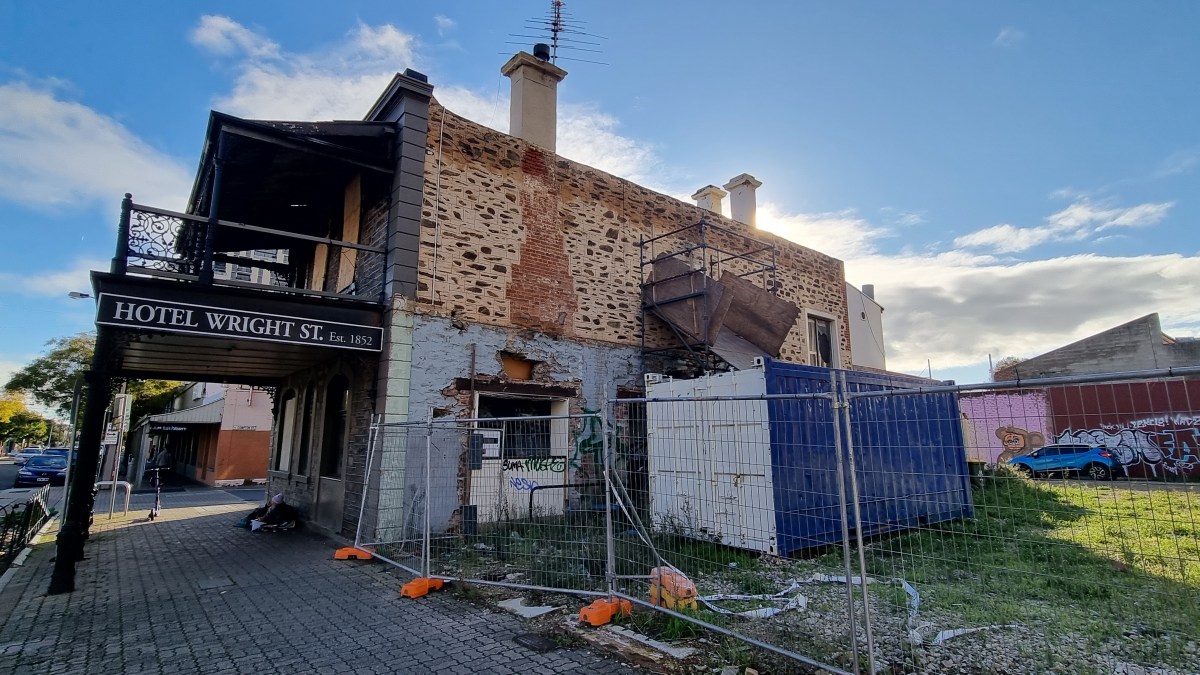
The dilapidated state of the vacant former Queens Arms Hotel on Wright Street. Photos: Thomas Kelsall/InDaily
Its new owners received approval a year later to build an 18-storey office building directly behind the pub, but no work began before planning approval expired in 2019.
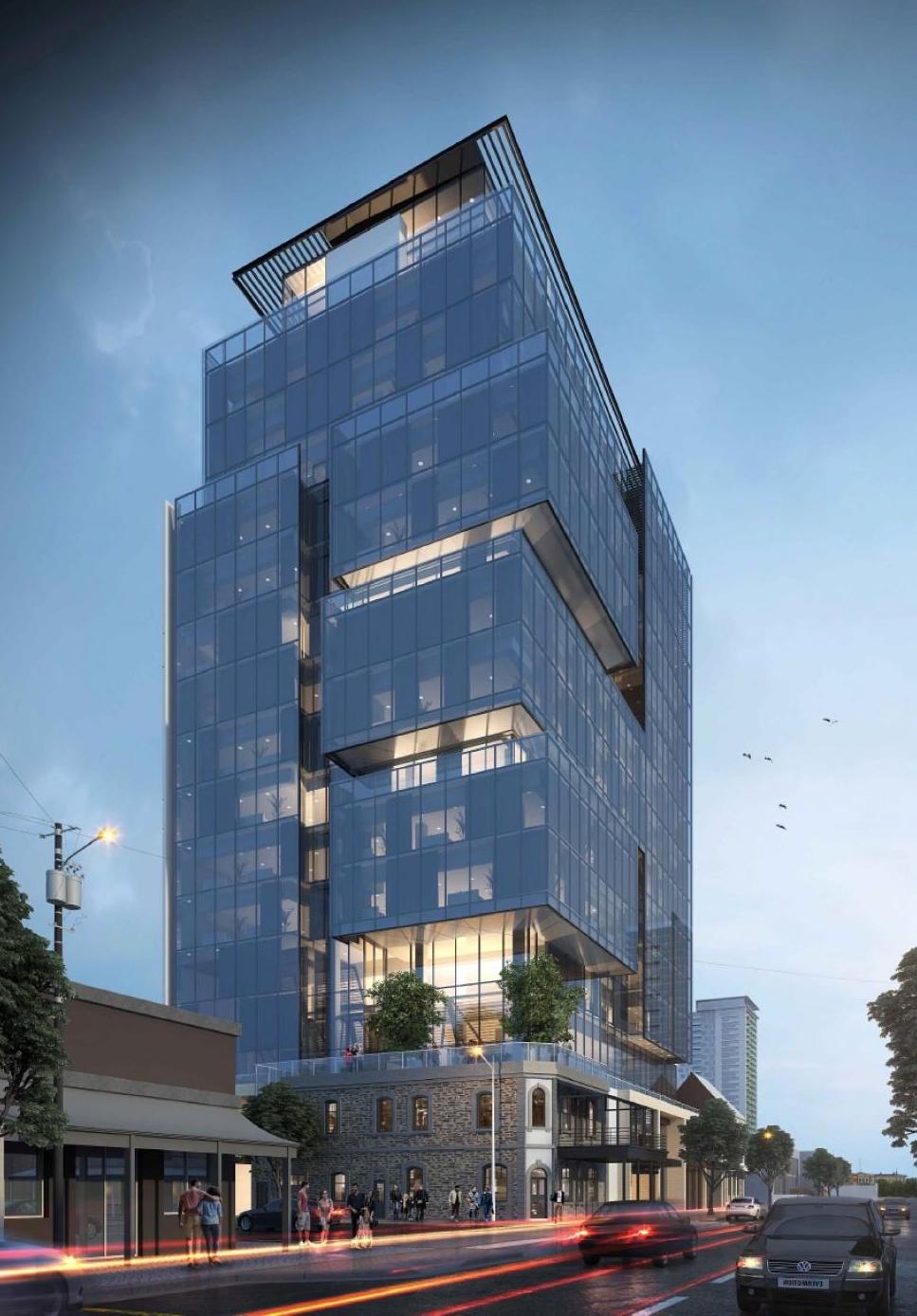
Planning approval for an 18-storey tower (pictured) directly behind the Hotel Wright Street expired in 2019. Image supplied
A fire gutted the interior of the 170-year-old hotel in March this year. Its future is uncertain.
The Edinburgh Castle Hotel on Currie St closed its doors in 2018 as a 17-storey, 772-bed student apartment block was erected behind it.
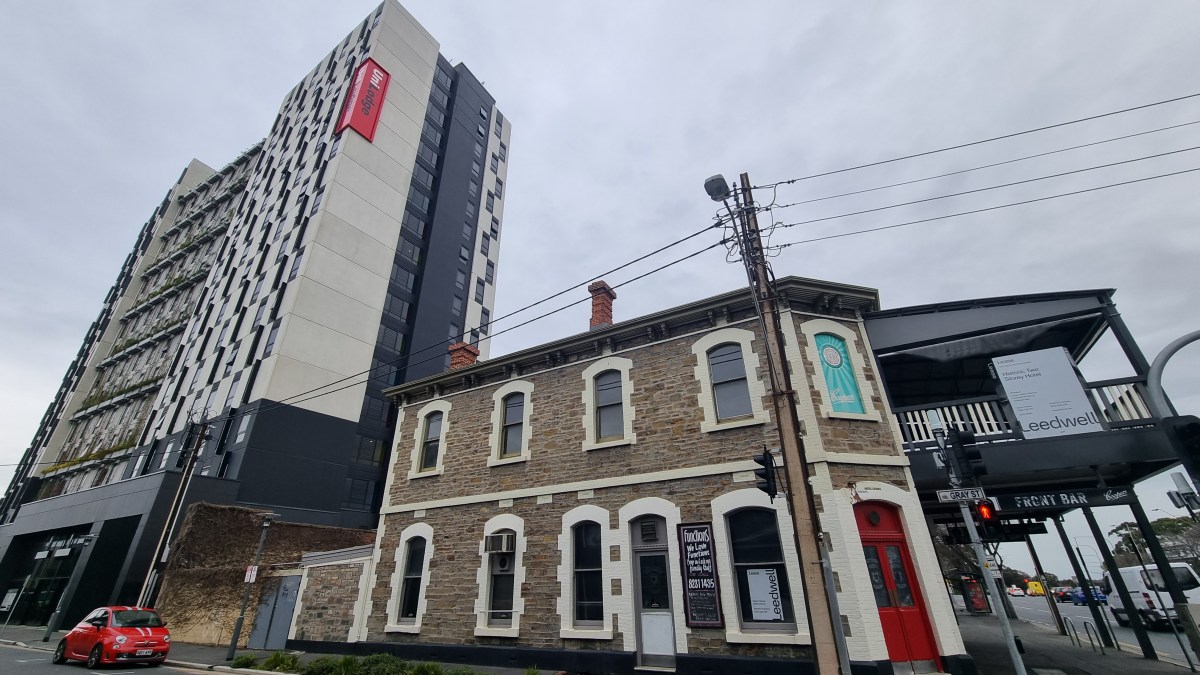
The Edinburgh Castle hotel shut down and another live music venue was lost when an apartment block was built next door. Photo: Thomas Kelsall/InDaily
‘The Ed’ was first licensed in 1837 and was home to a wide range of live music genres, including blues, indie, and alternative.
But the pub’s viability was threatened first by road blocks and disruption surrounding the construction project, even before the first residents moved in.
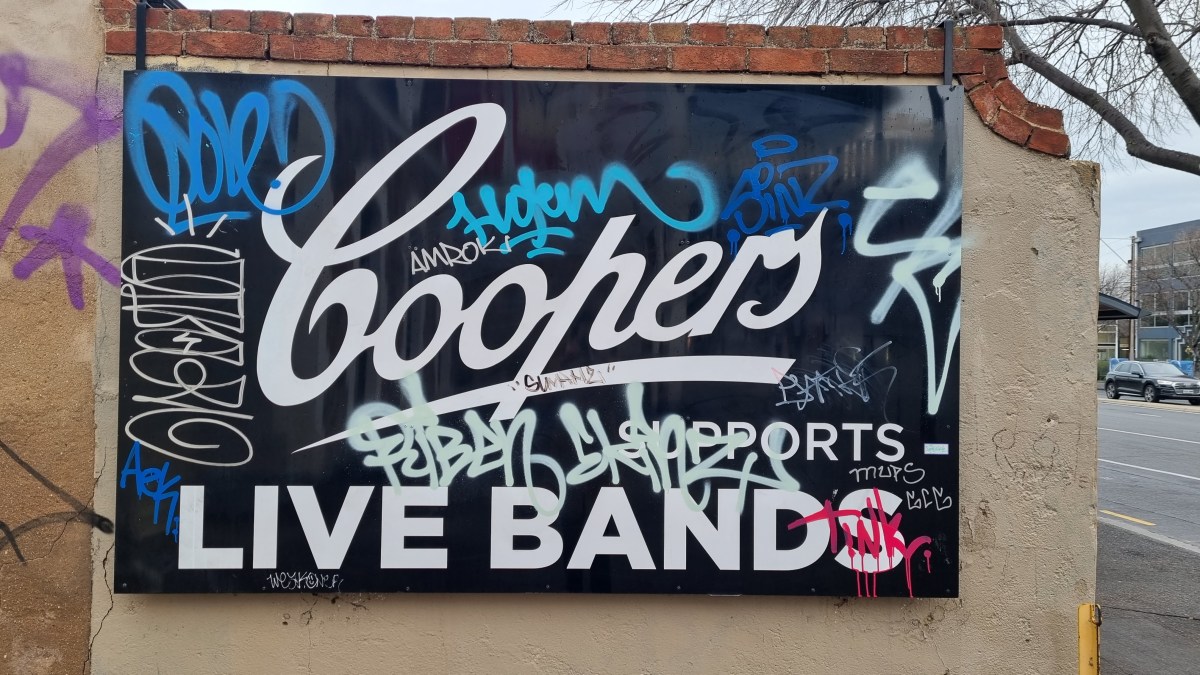
Sign of the old times at the closed Edinburgh Castle. Photo: Thomas Kelsall/InDaily
“The tension there was the obligation on the venue to put in noise limiting actuations – they had to address their own emittance of noise,” Australian Hotels Association SA CEO Ian Horne said.
The pub lobby boss said apartment proposals “create a level of fear and doom” for publicans as “history is not on the side of the licensed venue”.
He highlighted the case of live music stalwart The Grace Emily Hotel as an example of the “ongoing tension” between city residents and the pub music scene.
Once operating in a quiet part of lower Waymouth St, the pub has a new neighbour: a 17-storey student accommodation tower across the road.
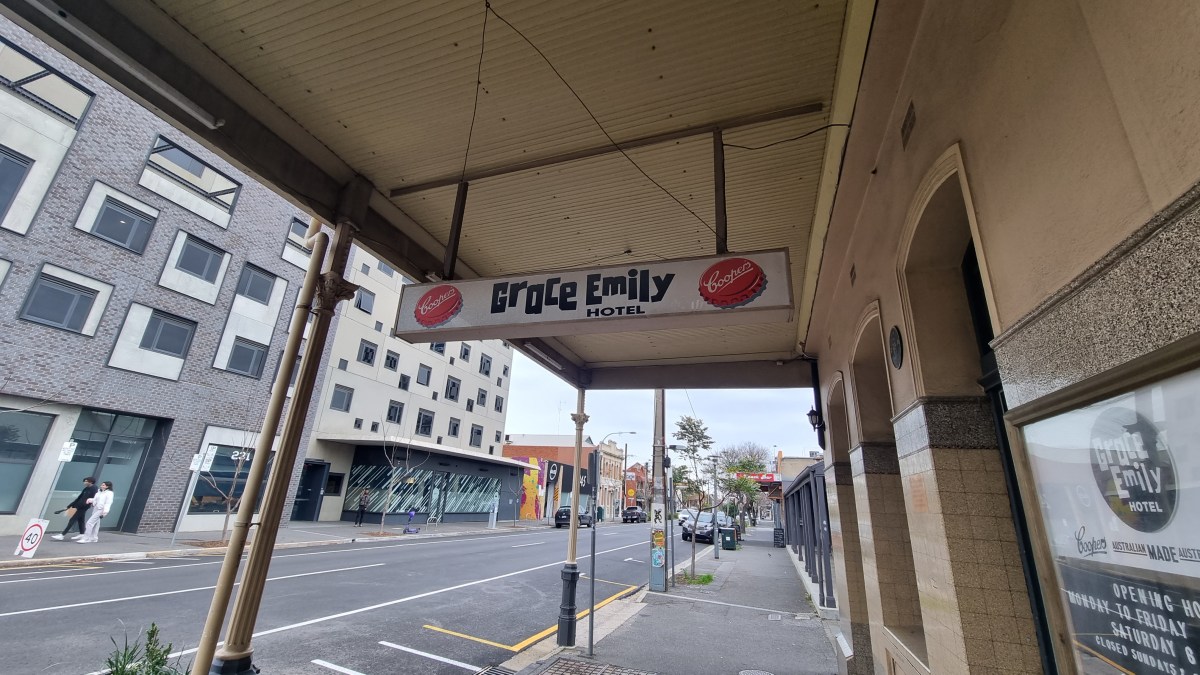
“[The Grace Emily] is a significant, iconic live music venue, and they’ve had and will continue to have challenges of managing that because so many high-rise apartments have been built around it,” Horne said.
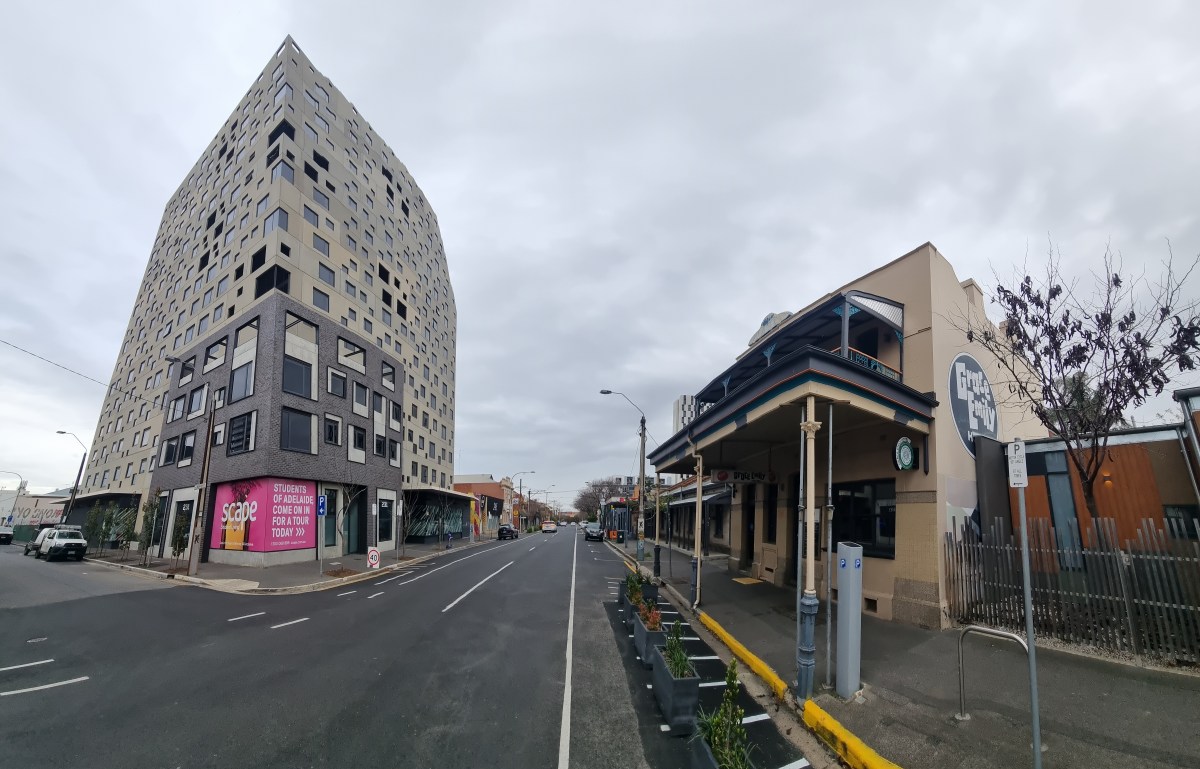
The Grace Emily Hotel on Waymouth St, with new neighbour. Photo: Thomas Kelsall/InDaily
“It goes back to the East End of Rundle Street: The Exeter, The Astor, The Stag – going back 20 to 30 years.
“Quite often, if you’re buying a residential property or an apartment near a licensed venue, then the price will reflect the level of risk, but once people move in and get comfortable, then residents have quite significant capacities to make complaints and have reviews of liquor licences.
“It’s an ongoing issue, it’s an ongoing tension, and certainly history would say live music venues generally come off second best.”
Long-running live band venue, The Crown & Anchor on Grenfell St, has also been bought by developers, who own surrounding properties and purchased the pub in 2016.
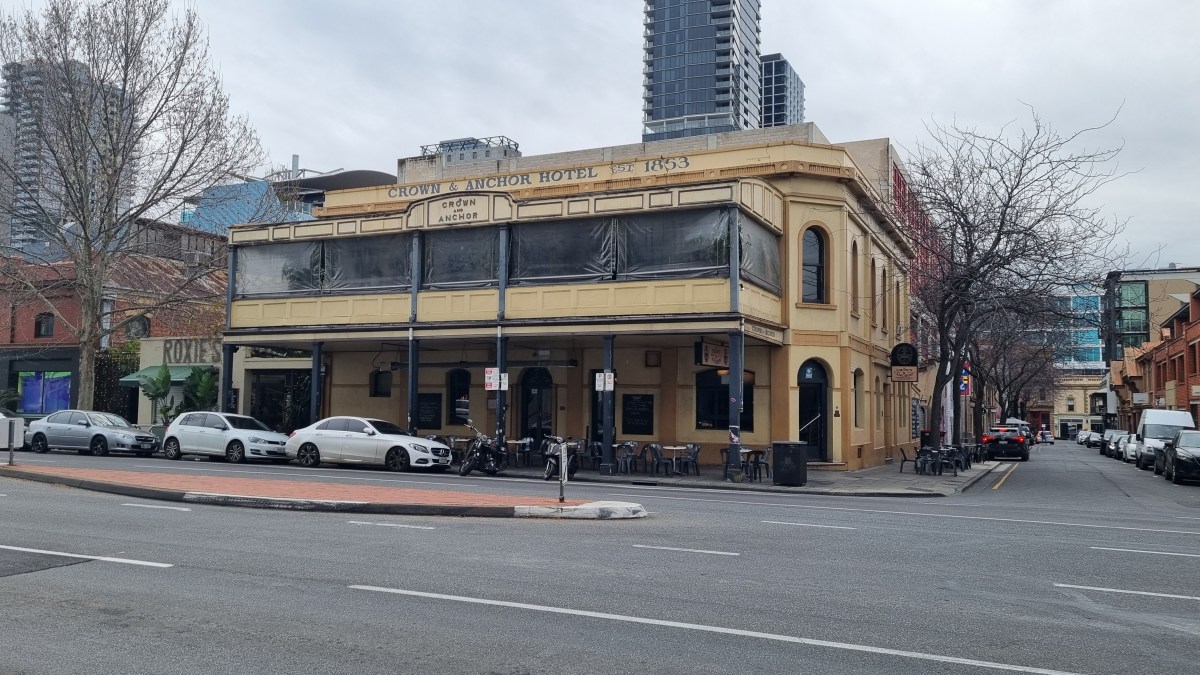
The Crown & Anchor on Grenfell St has hosted live music for decades but a development threat looms. Photo: Thomas Kelsall/InDaily
Plans for a 13-storey apartment complex next door to the Crown & Anchor were approved in 2013, but haven’t yet been actioned.
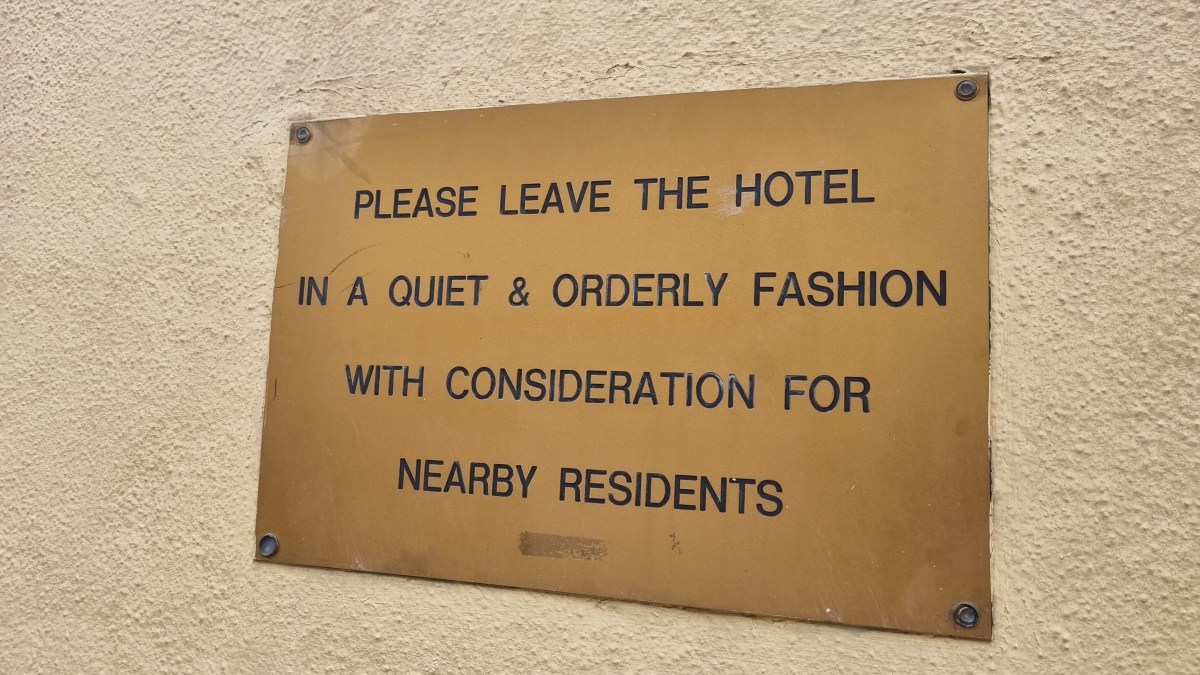
‘The Cranker’, which describes itself as the “home of cold beer and amplified music”, keeps a sign outside asking patrons to consider nearby apartment residents. Photo: Thomas Kelsall/InDaily.
Former owner of ‘The Cranker’, Kevin Gregg, said at the time his experience with the increasing residential development surrounding the nearby Exeter – where he remains a co-owner – informed his decision to sell up.
“We were going to be in a position where we could have held out and sat there and had a development happen around us, and that doesn’t necessarily always go well for pubs, especially the sort of pub that is essentially a rock and roll sort of pub,” he told CityMag after the sale.
“That really sort of changed the style of the way we ran The Exeter.
“The Exeter beer garden was famous for bands, and almost overnight we were forced to stop having bands in the beer garden.”
The Hotel Metropolitan, or Metro, on Grote St is still hosting alternative live bands – but also faces the looming threat of an approved 36-storey apartment and office tower slated for construction directly adjacent.
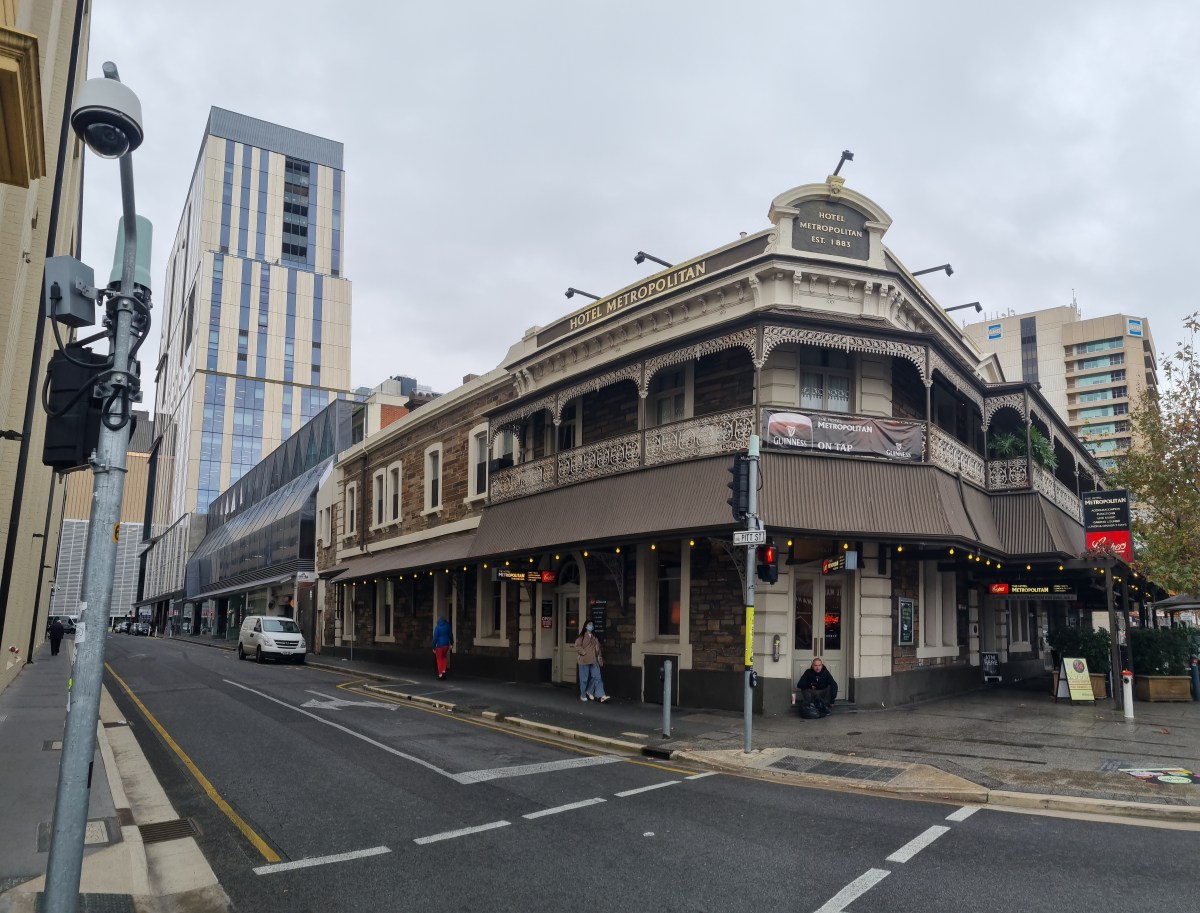
Live music stalwart Hotel Metro on Grote St. Photo: Thomas Kelsall/InDaily
Co-owner Damian Peterson, asked whether he thought the development would impact the pub’s live music offering, said: “I reckon it will.”
“Thankfully [it’s] still a year or two until completion.
“But on the flipside we have to deal with the disruption of the construction of it.
“We won’t be changing anything structurally. They obviously have to address their acoustic attenuation (triple glazing). We will just wait and see what happens at completion.”
Just outside the CBD, The Gov on Port Rd also continues to be a live music champion. The Producers on Grenfell St opposite the old East End markets, now apartments, was once a long-time rock and punk music haunt but is now mainly a nightclub, while The Squatters Arms on the western edge of the city is another former punk music haunt, but has stood empty for several years.
Pokies and Netflix: Why the landscape changed for musicians
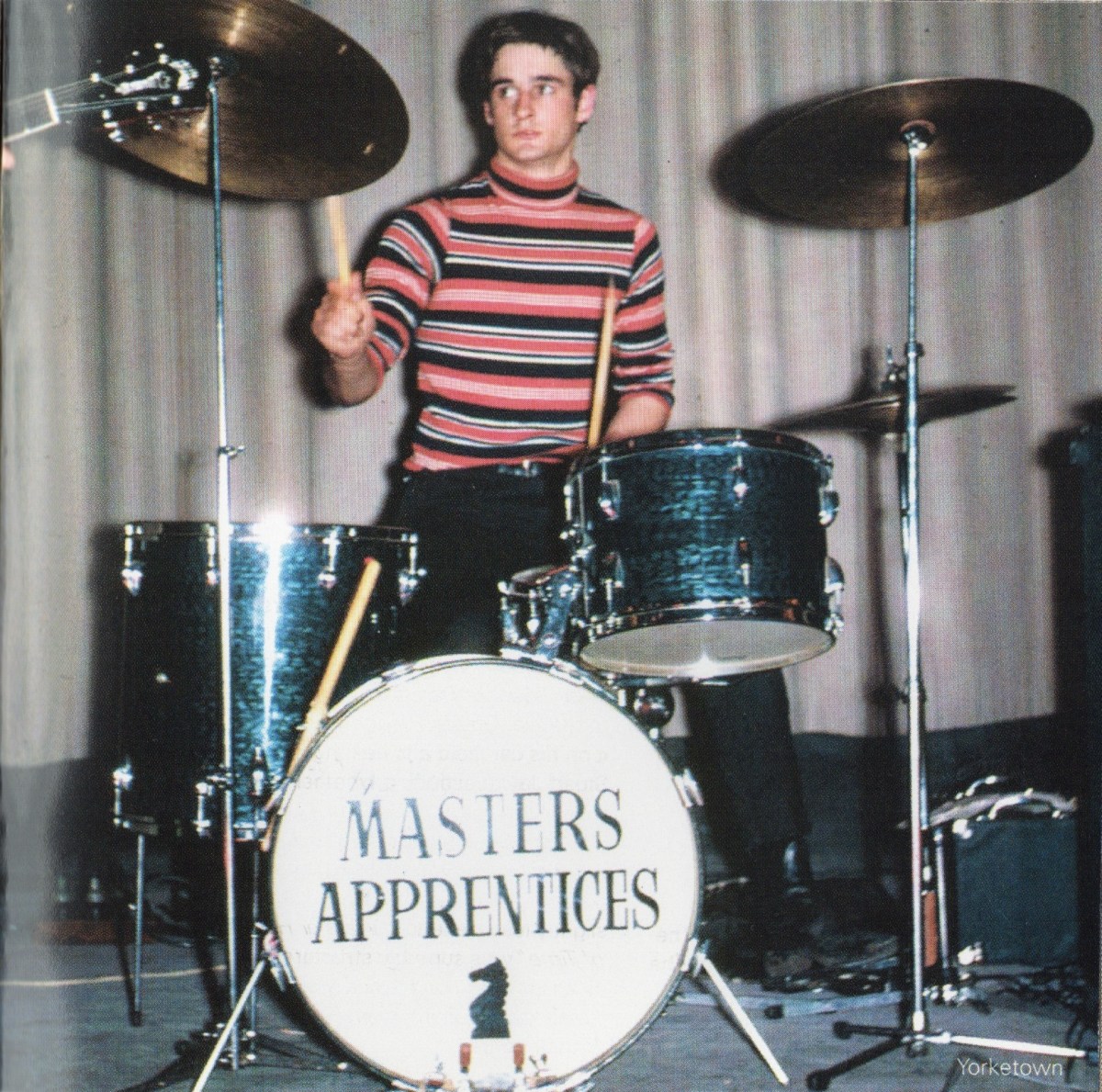
Drummer Brian Vaughton performing with The Masters Apprentices in the 1960s. Photo: supplied
Original Masters Apprentices member Brian Vaughton has been well placed to watch the transformation of Adelaide’s live music culture.
The 74-year-old drummer also has a spiritual connection to the King’s Head Hotel, owned by his family from 1934 through to 1996 – the latter 17 years with him in charge.
The historic pub was one of the first rehearsal spaces for The Masters after their formation as ‘The Mustangs’ in 1964.
“It was just the perfect place, we could leave our gear upstairs in the lounge room and that’s how we started practicing in the pub,” he recalls.
“We used to rehearse out the back shed, there used to be old horse stables out the back in John Street.”
Vaughton said it took until the late 1960s and early ‘70s for Adelaide’s live music scene to properly take off – aided by Labor Premier Don Dunstan’s successful push to abolish 6pm closing time laws in 1967.
“The live venues that were about in the ‘60s with the ‘60s music were not licensed generally,” Vaughton said.
“It was only later on towards the end of the ‘60s that the hotels picked up on it like The Findon and The Hotel Australia … they started to have live gigs.
“And then every other pub had a little band in the entrance, a little garage band of some nature.”
The closing time changes kicked off Adelaide’s golden age of live, amplified pub rock, which blared out across the suburbs and the city headlined by the likes of Cold Chisel, Fraternity, The Angels, Mickey Finn and No Fixed Address.
I don’t think it’s ever going to get back to how it was. It’s just the changing of the times.
But who turned down the music? Vaughton immediately points to the huge liquor licensing change introduced in 1994: pokies.
“What happened was poker machines came in and that was the end of it for musicians,” he said.
“Because prior to the poker machines, lots of pubs had live music from duos to bands. As you go out to the suburbs: Tea Tree Gully, Clovercrest, Golden Grove all out that area, down south of course, Victor Harbor they were big on it.
“Then the poker machines came in and publicans were making obscene amounts of money through the poker machines, so they didn’t need to pay the bands.
“It’s only come back I think in the last decade, music’s come back a little bit.”
But Horne from the AHA rejected the criticism, saying a “perfect storm” of factors such as the growth of FM radio in the 1990s, the loss of local music production companies and the influx of residential accommodation near pubs changed the landscape for musicians.
“[Gaming] may have changed the nature of the live music but certainly the statistics for the last four- or five-years of music censuses basically said that’s a bit of an urban myth,” he said.
He pointed to Music SA’s 2019 “live music census” which he said showed 15 of the top 20 pubs for live music gigs per month have gaming machines.
“We look back romantically at the 70s and the 80s, but even then we were a much more simple society compared to the affluence we have now,” he said.
“And with affluence comes expansion of prestigious accommodation that unfortunately is in prime places where often these live music venues are.”
BSide Magazine’s Dunstan, meanwhile, emphasises the rise of other cultural and social factors.
“There’s more choice to do stuff now,” he said.
“There’s also the proliferation of small bars which people really seem to like, small intimate bars where they can’t have any music but people like to go there and just drink and chat.
“I don’t think it’s ever going to get back to how it was. It’s just the changing of the times, there’s more choice – you can stay home and watch multiple movies on Netflix whereas back in the old days you had four television channels to choose from.”
He struck a more upbeat tone on the current state of Adelaide’s music scene, highlighting the Lion Arts Factory in Adelaide’s west end and Jive on Hindley Street as two venues continuing the tradition, while historic venues like The Austral and Exeter are getting back to their live music roots.
What next for the King’s Head?
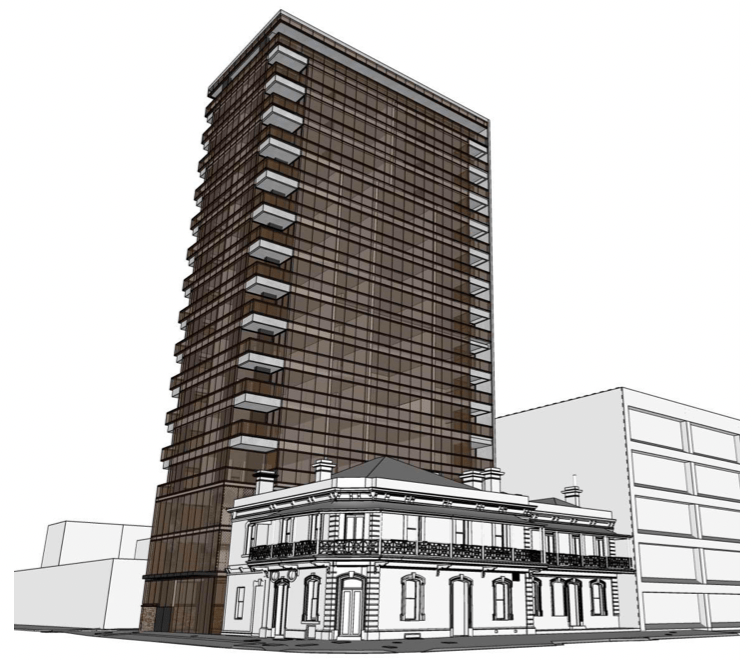
A render of the proposed 16-storey tower at the back of the King’s Head Hotel. Image: Future Urban
The proponents of the 16-storey King’s Head tower intend to keep live and amplified music at the pub regardless of whether their development is approved or not.
That’s welcome news for Vaughton, who hopes to perform with old Masters Apprentices at the “beautiful bluestone building” sometime in the near future.
“It’s sort of like going home, putting a full stop on the end of the sentence,” he said.
“So we will go back there, it’s very important to [Masters Apprentices musical director] Michael Bower and I, who I grew up with.
“We’re just sort of finishing everything off, we’re going back as we started all except for [former lead singer] Jim [Keays] because he’s passed away.”
The King’s Head closed its doors in April 2020 after taking a major hit at the start of the pandemic, but the pub reopened in March 2021 under new leasee Patrick Marcucci, who has renovated its interior and brought live music back.
Dunstan, who like now-Prime Minister Anthony Albanese was once a DJ at the King’s Head, said the new tower proposal could pose a threat to the pub’s live music offering.
“It’s had live music on and off over the years,” he said
“It was in the front bar, it was quite crowded, but then there were no residencies around at all. But now of course they’re going to build this high rise at the back of it.
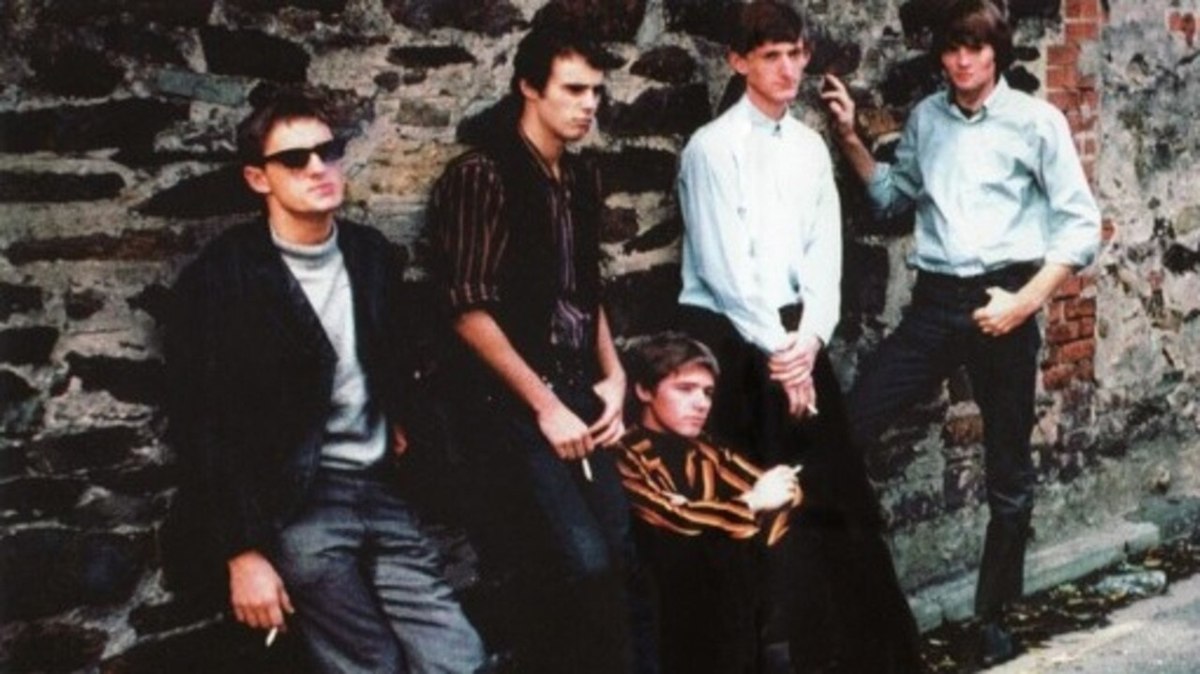
Original Master Apprentices members Brian Vaughton, Rick Morrison, Jim Keays, Mick Bower and Gavin Webb on John Street, behind the King’s Head, in the 1960s. Photo: supplied
“I can’t see them attracting people staying there if there’s going to be live music there, it’s going to be off-putting I would think.
I can see why people staying in the hotel, whether or not they like music, if it inconveniences them – they’re going to complain.
The development consultants working on the King’s Head project, Future Urban, intend to keep the pub operating as a “long-term and viable live music venue” and “reinvigorate” its social and entertainment offering with a series of refurbishments and internal works.
Future Urban engaged acoustic services firm BESTEC to prepare a report on the noise which will surround the proposed apartment building.
BESTEC recommended a series of “noise attenuation methods” to limit noise intrusion into the 16-storey apartment tower, including the installation of doubled glazed glass around the King’s Head pub space.
“Based on the assumption that the space will be used for functions with typical reverberant sound level of 90dBA and the music noise criteria derived on the basis of the measured background noise levels, we recommend double glazing … to be installed to the pub space,” the report states.
Future Urban associate director Jasson Cattonar, responding last month to concerns from nearby residents about noise, said the developer was committed to installing the recommended noise reduction measures.
“Notwithstanding, it is important to note that the hotel has been operating with existing use rights as a licensed premises, coupled with guest accommodation, for more than 145 years,” he said.
“Live music and other forms of amplified entertainment are historical and inherently important features of the existing use rights.
“This proposal seeks to continue those existing use rights albeit with a more intense tourist accommodation component.”
The State Commission Assessment Panel will assess the project on Wednesday. A government report published last week recommended the 53m tower for approval.




